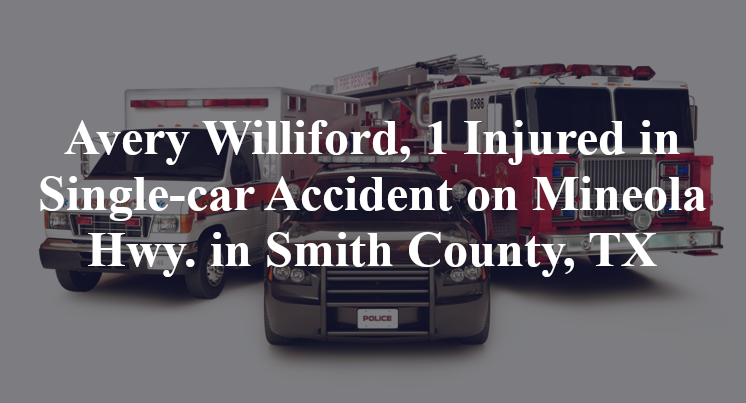Avery Williford, 1 Injured in Single-car Accident on Mineola Hwy. in Smith County, TX
Lindale, TX — January 19, 2025, Avery Williford and another person were injured in a single-car accident at about 1:45 a.m. on Mineola Highway (U.S. 69).
According to authorities, a 23-year-old man and his passenger—21-year-old Avery Williford—were traveling in an eastbound Ford F-150 on S.H. 49 approaching the U.S. Highway 69 intersection when the accident took place.

Details surrounding the accident remain scarce. Officials indicate that, for reasons yet to be confirmed, the Ford failed to appropriately control its speed. It was subsequently involved in a single-vehicle rollover accident at the intersection, according to reports.
Both Williford and the man who had been behind the wheel of the pickup suffered reportedly serious injuries over the course of the wreck. Additional information pertaining to this incident is not available at this point in time. The investigation is currently ongoing.
Commentary by Attorney Michael Grossman
When I read about a crash like the one that left Avery Williford and another person seriously injured, I know that many people will assume it was simply a case of driver error. While that’s certainly a possibility, my experience has shown me that single-vehicle crashes—especially those involving rollovers—are often more complex than they first appear. Instead of making assumptions, it’s important to ask the right questions to ensure that all possible contributing factors are explored. To that end, there are three critical questions that need to be considered.
First, did the authorities conduct a thorough investigation? When a vehicle overturns at an intersection, investigators should determine whether external factors played a role. Did law enforcement examine the roadway for hazards such as debris, uneven pavement, or poor lighting? Did they collect statements from any available witnesses? Were there indications that another vehicle’s actions contributed to the crash? The quality of the investigation will determine whether all possible explanations are explored or if key details are overlooked.
Second, has anyone looked into whether a vehicle defect contributed to the crash? Rollovers can sometimes be linked to mechanical issues rather than driver error. Problems with steering, braking, or electronic stability control could make it difficult to maintain control. Additionally, some vehicles—particularly trucks and SUVs—have a higher risk of rolling over due to their design. If the vehicle’s safety systems, such as airbags or seat belts, failed to function properly, that could also impact the severity of the crash. Unfortunately, these factors are rarely investigated unless someone specifically requests a forensic vehicle inspection. If the vehicle is quickly repaired or scrapped, any evidence of a defect may be lost before it can be analyzed.
Lastly, have investigators gathered all available electronic data? Most modern vehicles are equipped with event data recorders (EDRs), which capture crucial details such as speed, braking, and steering inputs in the moments leading up to a crash. This data could help clarify whether the driver attempted to correct the vehicle’s path or if the vehicle responded unpredictably. Additionally, if any nearby businesses or traffic cameras recorded the crash, that footage could provide valuable context. If this evidence isn’t secured quickly, it may become unavailable, making it harder to determine the full circumstances of the accident.
At the end of the day, answering these questions could be essential to understanding what really happened and why. A thorough examination of all three of these issues—including the quality of police investigations, possible vehicle defects, and electronic data—is the least that can be done to ensure that those affected by the crash receive the answers they deserve.

*We appreciate your feedback and welcome anyone to comment on our blog entries, however all visitor blog comments must be approved by the site moderator prior to showing live on the site. By submitting a blog comment you acknowledge that your post may appear live on the site for any visitors to see, pending moderator approval. The operators of this site are not responsible for the accuracy or content of the comments made by site visitors. By submitting a comment, blog post, or email to this site you acknowledge that you may receive a response with regard to your questions or concerns. If you contact Grossman Law Offices using this online form, your message will not create an attorney-client relationship and will not necessarily be treated as privileged or confidential! You should not send sensitive or confidential information via the Internet. Since the Internet is not necessarily a secure environment, it is not possible to ensure that your message sent via the Internet might be kept secure and confidential. When you fill out a contact or comment form, send us an email directly, initiate a chat session or call us, you acknowledge we may use your contact information to communicate with you in the future for marketing purposes, but such marketing will always be done in an ethical way.